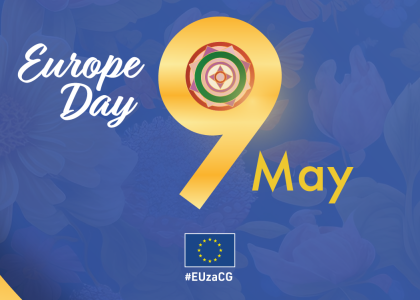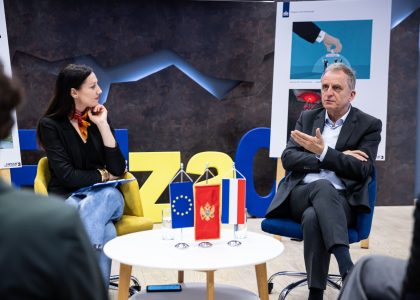The European Union’s Erasmus+ programme for education, training, youth, and sports was ongoing during the coronavirus pandemic, even though its essence is in the mobility of young people, i.e. their stay abroad. The programme has been adapted to the existing circumstances, so some of the activities in the field have been postponed or replaced by online work. Starting from the next semester, a combined mobility model will be applied for the first time.
What does this mean, how does Erasmus+ works at the moment, when will new calls be announced, and what are the experiences of young people from Montenegro who are now staying abroad, are some of the questions which have been discussed during the webinar “Erasmus coffee at a distance,” organised by the EU Info Centre.
Although the situation with the coronavirus pandemic is changing on a daily basis, it is certain that students from Montenegro can apply for a scholarship in one of the European countries this year, confirmed Rina Muhaj, from the National Erasmus+ Office during the webinar.
“Higher education institutions are required to enable combined mobility, which includes virtual and physical mobility. Students who receive a scholarship, can start their mobility in a virtual way, that is, to follow their lectures online, and then, when the situation allows, to start the physical mobility process, that is, travel to the country of their choice,” explained Muhaj.
The University of Montenegro has signed bilateral agreements with 114 universities across Europe, and each semester it announces about 60 calls within the Erasmus+ programme. The next call will be announced in September, says Nikolina Radulović, from the Center for International Cooperation of the University of Montenegro.
“Our plans are to announce competitions again in September, and it depends on the epidemiological situation and circumstances how everything will go,” said Radulović.
Students who have completed at least the first year of college have the right to apply. They can search for the competitions on the website of the International Cooperation Centre and have three weeks to collect the required documentation. Our speakers pointed out that the grade point average is not crucial, but that special attention is paid to knowledge of the language and the extracurricular activities. Students from private universities can also apply, but only to those European universities which their university has signed contracts with.
The amount of the scholarship is around €850, and the costs of the plane ticket are also covered. In the case of combined mobility, students will not receive a grant during the virtual part, that is, they will start receiving a scholarship only when they travel to another country.
In addition to student exchanges, it is also possible to volunteer within the Erasmus+ programme. It is about the European Solidarity Corps, which is intended for young people aged 18 to 30, regardless of whether they are studying. The calls are available on the website of this programme and are open all year round. As part of volunteer projects, the costs of airplane ticktes, accommodation, insurance, and language courses are covered, and a monthly allowance of about €400 is provided.
“This programme is relatively new, it was launched in 2018 and is based on the basic principles of the EU, primarily on the principle of solidarity. It offers young people opportunities to volunteer in various projects covering a wide range of areas – culture, human rights, health, environmental protection, and so on. A diploma and a high grade point average are not needed, but only the will to contribute to the wider community,” said Mirela Kalamperovic, from ADP Zid.
Currently, three girls from Montenegro are volunteering within this project. One of them is Jelena Zecevic, who joined the webinar from Italy. At the moment of the pandemic outbreak, she lived in Milan, from where she returned home for a short time.
“I was in contact with the organisation at all times, they informed us about our rights and possibilities, I had the option to go home and now return to Italy again. Before the coronavirus, I worked in the office for about seven hours. I was involved in all activities, I helped organise events, and I really felt like part of a team. I can say that I gained a nice experience of working abroad,” Jelena shared her volunteer experiences.
The Erasmus programme was founded in 1987. Erasmus+ inherited and merged four programmes in which Montenegro participated during the period from 2007 to 2013: Tempus, Erasmus Mundus, the Lifelong Learning Programme, and the Youth in Action Programme. Erasmus+ is active in 33 countries, which include all EU members, as well as Turkey, Macedonia, Norway, Iceland, and Liechtenstein. Montenegro is participating thanks to the fact that the programme is open to partner countries around the world. The existing Erasmus+ programme, which started in 2014 and will last for seven years, has a budget of €14.7 billion. A new seven-year Eramus+ plan will be created soon.


